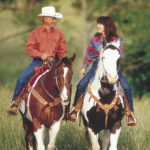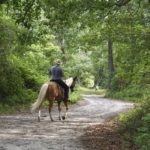Riding offers much more than equestrian know-how. Here’s why horses can be a life-enhancing choice for your child.
Margaret Coon learned a lot about first aid and crisis management during her time with the United States Pony Clubs. So much so, in fact, that when she grew up and was dealing with her own child’s bump on the head, someone from her pediatrician’s office mistook her for an RN.
“No, I’m not,” explained Margaret, who’d wowed the staff by having her baby’s pulse, respiration, and pupil size available for the doctor. “This is just what you do before you call the veterinarian.”
That degree of composure under pressure is common among Pony Club kids. Margaret’s mother, Ruth Harvie, says the incident is but one of many involving her children, all raised with horses.
“I can’t tell you how many times my husband and I have thanked God for Pony Club,” she says today. Her sentiment, surprising perhaps to the non-horsey set, is widespread among equestrian families. Just ask Darwin Pluhar.
“I don’t know of a better way to raise kids,” observes the father of three, all of them riders. “They learn to think on their feet. They learn respect. And they learn to accept responsibility for their actions.”
In January, Pluhar’s eldest son, Zane, received the Texas Quarter Horse Youth Association’s outstanding youth award. Now finishing his first semester at Texas A & M University, Zane plans to become an equine veterinarian. Younger son Joe and daughter Logan are also active in the association.
“Riding and showing teaches youngsters to prepare, and to muster the courage to compete,” notes their mom, Jenny Pluhar. “They learn to take the risks, enjoy the rewards, and deal with the disappointments.”
Riding families have always known horses are good for kids, but now research is proving it. One study, sponsored by the American Youth Horse Council, found that equestrian activities do indeed enhance a range of life skills in children. The study looked at youngsters involved in 4-H, Pony Club, the American Quarter Horse Youth Association, or the National High School Rodeo Association in one eastern and one western state. Results of the study, published in February 2006, found a significant positive relationship between horsemanship skills and life skills.
“If your child likes animals and you’re concerned about that child’s problem solving, goal-setting, or decision-making skills, then definitely get him or her involved with horses,” says Ann Swinker, Ph.D., a professor in Animal Science at Penn State University and one of the study’s co-authors.
An earlier study, conducted by the University of Nebraska at Lincoln, found that 4-H horse shows were much more than just an enjoyable activity for children.
“Clearly,” says Kathy Anderson, PhD, the study’s author, “participating in these shows enhances important skills, including goal-setting, self-reliance, and follow-through.”
Better Kids Through Horses
If you’re an equestrian, you already know how beneficial horses are for children. If you’re not, you may be surprised to learn just how constructive horse involvement can be. Here’s a quick rundown of what “growing up with horses” can mean for your child:
Wholesome fun
Horses make wonderful childhood companions. Children are naturally attracted to them, and that makes horses a desirable alternative to TV-watching, Internet-surfing, or just “hanging out.” Horseback riding also puts children in touch with nature, and can be enjoyed alone or in groups.
When the whole family gets involved, the time spent together with horses can enhance the bond among family members and become the stuff of treasured childhood memories. Moreover, the benefits of horse involvement are enduring, as a child’s “horse habit” can evolve into a rewarding lifelong hobby.
Character development
Handling, riding, and caring for a horse or pony can develop a host of positive traits in a child, including responsibility, accountability, patience, level-headedness, empathy, kindness, and self-discipline.
In Dr. Anderson’s survey of youngsters competing in 4-H horse shows, subjects ranked learning to do their best and developing self-respect as among the greatest benefits of their involvement.
“The most important thing I’ve learned,” wrote one 17-year-old study participant, “is that hard work and believing in yourself can get you anywhere.”
Even equine nature itself can exert a positive influence on a child.
“Horses can’t be made to feel guilty, or talked into saying yes when they know they should say no,” observes Dr. Janet Sasson Edgette, an equestrian sport and child/adolescent/family psychologist, and author of Heads Up: Practical Sports Psychology For Riders, Their Families, and Their Trainers (www.HorseBooksEtc.com or www. headsupsport.com). “They simply respond to what their rider does. Riding enables kids to realize how their choices, attitudes, and behaviors affect the other living creatures around them,” she adds.
Scholastic enhancement
The perseverance needed to ride well can translate into improved performance in the classroom. “Riding increases a child’s focus and intensity,” observes California trainer Carol Dal Porto, who prepares youngsters to compete on the Appaloosa circuit. “You can’t let your mind wander when you’re riding a 1,200-pound animal.” This learned concentration later shows up in kids’ schoolwork, “to their parents’ delight,” adds Dal Porto.
Leadership training
Especially if your child becomes involved with a group like Pony Club, 4-H, or the youth group of a breed association, the opportunities for learning management and leadership skills abound.
“Holding an office, leading a smaller group of children, working on a project–all of these are ways in which youngsters learn and grow,” says Mary Fay, the American Youth Horse Council’s 2003 Youth Horse Leader of the Year. “4-H requires children to keep records of their time, activities, and money spent. These are all important life skills.”
Health benefits
Riding is terrific exercise. “People who think the horse does all the work have never really ridden,” notes Katie Phalen, an instructor at Waredaca Farm in Gaithersburg, Maryland. Apart from its aerobic benefits, riding also helps a youngster develop balance, coordination, and flexibility, she notes. Moreover, the activities involved in caring for a horse?grooming, hefting buckets and saddles, cleaning stalls?can make for a great upper-body workout.
Then, too, as children learn how important good nutrition, veterinary check-ups, dental work, and regular exercise are to a horse, they begin to appreciate their own health needs.
OK, But Aren’t Horses Expensive?
They don’t have to be. Besides, as all parents know, expense is a relative term in child rearing.
“One Pony Club dad summed it up this way,” notes national Pony Club past president Melanie Heacock. “‘I knew that when my daughter turned 13, I was going to be spending a lot of money–at the shopping mall, on behavior counseling, or on horses. I chose horses, and I’ve never regretted it.'”
In the 21st century, when parenting is not a job for the faint at heart, horses provide a way to keep youngsters positively engaged during those “scary” years from pre-teen through young adulthood.
Helpful Contacts:
American Youth Horse Council, Inc.
6660 #D-451 Delmonico Drive
Colorado Springs, CO 80919
ayhc@mindspring.com
www.ayhc.com
800-879-2942
719-594-9778
Publishes several titles of interest to new horse owners (see “Resources”). Results of its study, “The Impact of Equine Activities on Youth Development,” are now available.
American Horse Council
1616 H Street, NW, 7th Floor
Washington, DC 20006
ahc@horsecouncil.org
www.horsecouncil.org/ahc.html
202-296-4031
Publishes the Horse Industry Directory, the most comprehensive listing of horse-related organizations in the nation.






